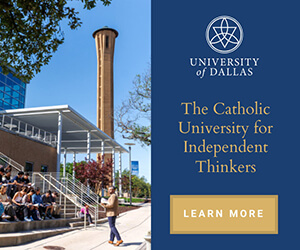The Church encourages us to seek holiness by following Christ’s Beatitudes. Let’s delve into these Beatitudes in relation to the Commandments.
Blessed the Poor in Spirit (Commandment 10)
The first Beatitude—“Blessed are the poor in spirit, for theirs is the kingdom of heaven” (Matthew 5:3) recalls the 10th Commandment: “Don’t covet your neighbor’s goods.” This Beatitude comes first because “the love of money is the root of all evils; through this craving, some have wandered from the faith” (1 Timothy 6:10); let’s be content with what leads to happiness in heaven.
God created material things good! Just as the soul needs the body in order to act, the body needs material goods (food, drink, and clothing) to stay healthy, fulfill our earthly mission, and extend our capacity to act, (think of cell phones, automobiles, etc.). But material goods are means, not ends in themselves: “for where your treasure is, there your heart will be” (Matthew 6:21). The poor in spirit—even if wealthy—set their hearts and desires on God and heaven (see CCC 2541-3). All that they are and have is from God, enabling them to serve God and others and to build up heavenly—not earthly—treasure by prayer and sacrifice. So, “detachment from riches is necessary for entering the Kingdom of heaven” (CCC 2556). As Christ says:
“Do not be anxious about your life, what you shall eat or what you shall drink, nor about your body, what you shall put on. Is not life more than food, and the body more than clothing? Look at the birds of the air: they neither sow nor reap nor gather into barns, and yet your heavenly Father feeds them. Are you not of more value than they? … And why are you anxious about clothing? Consider the lilies of the field… I tell you, even Solomon in all his glory was not arrayed like one of these. But… will [God] not much more clothe you, O men of little faith? Therefore do not be anxious, saying, ‘What shall we eat?’ or ‘What shall we drink?’ or ‘What shall we wear?’ For the Gentiles seek all these things; and your heavenly Father knows that you need them all.” (Matthew 6:25-33).
Attachment to material possessions makes us anxious for them; trusting God’s loving providence confers peace. Employees, anxious about possible layoffs, paralyze a company, as everybody endlessly chatters about “what if…” and “who’s next…” and no work gets done. So, don’t be anxious about tomorrow, but seek first God’s kingdom and holiness as he cares for all our real needs. As Pope Francis points out:
The Gospel invites us to peer into the depths of our hearts, to see where we find our security in life. Usually the rich feel secure in their wealth and think that, if that wealth is threatened, the whole meaning of their earthly life can collapse… Indeed, once we think we are rich, we can become so self-satisfied that we leave no room for God’s word, for the love of our brothers and sisters, or for the enjoyment of the most important things in life. In this way, we miss out on the greatest treasure of all (Gaudete et Exsultate 67-68).
Sin makes us rich in spirit seeking to accumulate material goods in a disordered way: for pride, security, independence, or to dominate others: “Those who desire to be rich fall into temptation… and hurtful desires that plunge men into ruin and destruction” (1 Timothy 6:9), leading to selfishness, lying and fraud, stealing, and violence. They become proud and stingy, feeling superior by their many possessions. Riches (mammon) enslave us, losing our freedom to love, causing us to disvalue our relationship with God and our final destiny in heaven.
Let’s look at our own personal attitudes towards material things. How do I react when someone dings my car, or “borrows” something dear to me? Do my reactions and attitudes reflect our Lord’s: “Foxes have holes, and birds of the air have nests; but the Son of man has nowhere to lay his head” (Matthew 8:20)? Poverty of heart (see CCC 2534-47) will help us to see material goods as means to holiness and apostolate, helping us serve God and those less fortunate than ourselves. “What would it profit a man if he shall gain the whole world, and lose his own soul?” (Mark 8:36)… and lose that true happiness in heaven.


